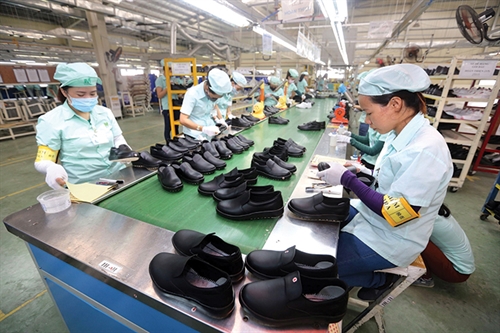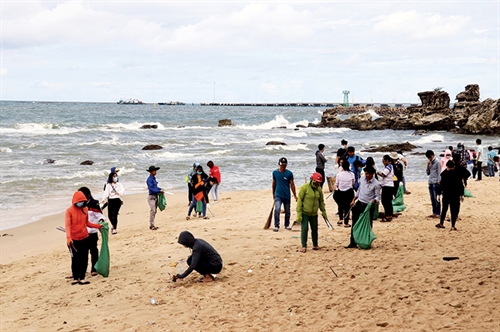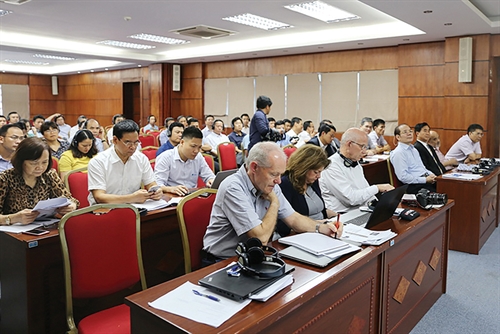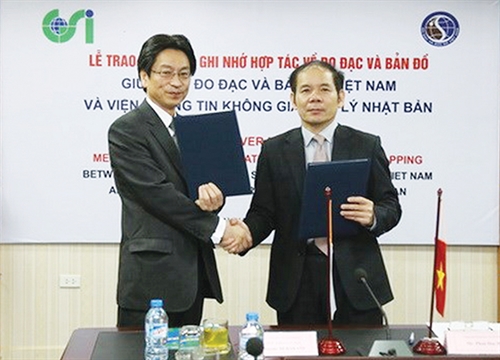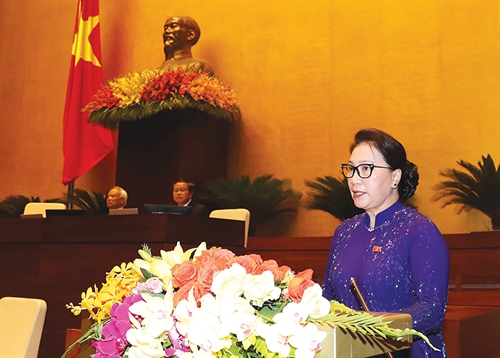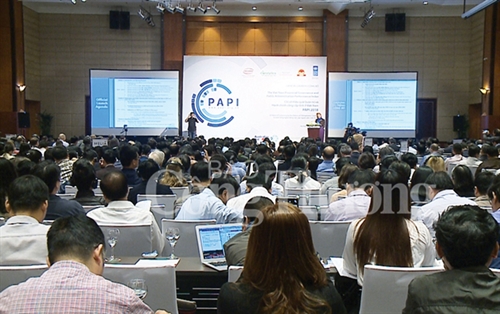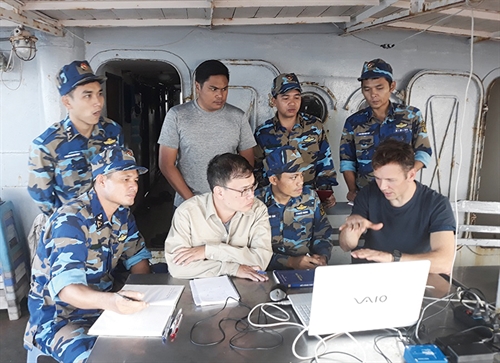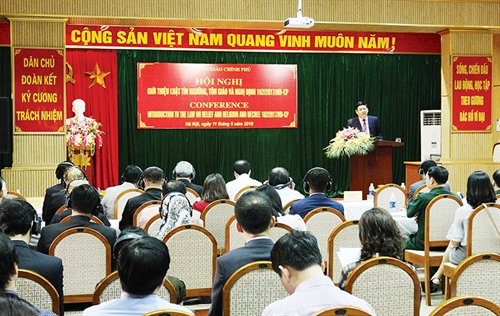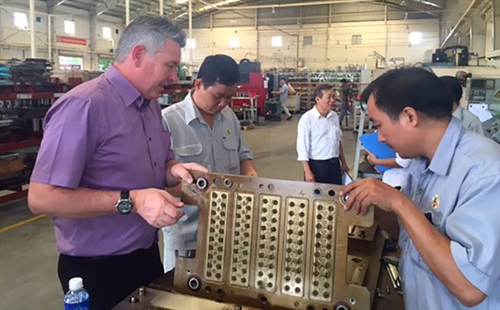The Political Bureau of the Communist Party of Vietnam has adopted its first-ever resolution on orientations to perfect institutions and policies for and improve quality and efficiency of foreign investment cooperation through 2030. Resolution 50/NQ-TW is expected to enable foreign investors to move forward for future development and help improve the quality of foreign investment inflow in the country.
Viewpoints and objectives
The resolution states that the foreign-invested sector, a significant component of Vietnam’s economy, is encouraged to develop, cooperate, and compete equally with other economic sectors. The State respects and protects lawful rights and interests of investors, ensuring the harmony of interests between the State, foreign investors and workers in foreign-invested enterprises.
As resolved by the Politburo, the country will attract foreign investment in a selective manner, focusing on quality, efficiency, technology and environmental protection. Priority will be given to projects that use advanced technology and modern management with high added value and spillover effects and are able to connect to the global production and supply chain.
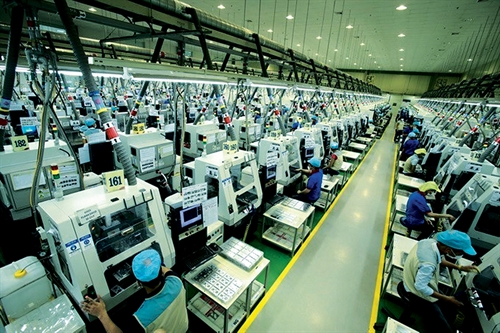 |
| Electronic component production lines of Bokwang Vina Company Ltd. in Diem Thuy industrial park, Thai Nguyen province__Photo: Hoang Hung/VNA |
The resolution sets forth the overall goal of making policies and regulations on foreign investment cooperation more competitive to serve international integration and meet the requirements of growth model reform, economic restructuring, environmental protection, effective solution of social issues, and improvement of quality, efficiency and competitiveness of the economy. Another overall goal is to bring the country’s business environment and competitiveness to be among the top four countries in the ASEAN before 2021 and top three before 2030.
Vietnam targets to attract up to USD 200 billion or USD 40 billion per year in registered capital during 2021-25; and USD 300 billion or USD 50 billion per year during 2026-30. The disbursed investment capital will hover USD 100-150 billion during 2021-25; and USD 150-200 billion during 2026-30.
The ratio of enterprises using advanced, environment-friendly technology and modern management is expected to increase to 50 percent by 2025 and 100 percent by 2030.
The localization rate is set to rise from current 20-25 percent to 30 percent by 2025 and 40 percent by 2030 while the percentage of trained workers in foreign-invested enterprises will increase from 56 percent in 2017 to 70 percent by 2025 and 80 percent by 2030.
Tasks and solutions
The resolution outlines seven groups of solutions, specifying a number of institutions and policies that need to be improved to facilitate the building of a favorable investment and business environment.
It says the domestic legal system will be improved to address existing limitations and problems faced by foreign investment such as thinned-out capital, transfer pricing and shadow investment. The nation will modify and add provisions on investment procedures and conditions, definitions of specific investment activities, list of geographical areas, sectors and entities eligible for investment incentives to the foreign investment law and other relevant laws.
To be considered for grant of investment registration certificates (or documents of equivalent legal value), new investment projects will have to undergo thorough scrutiny for their possible implications to national defense and security. Special attention will also be paid to improving and synchronizing the investment, securities and foreign exchange management laws toward clearly extinguishing direct investment from indirect investment and unifying regulations on accounts for share trading and transfer.
Authorities in charge of investment management will draw up a specific list of sectors in which foreign investment is restricted in conformity with the nation’s international commitments, and set out criteria for selection and prioritizing investment in line with master plans and development orientations of sectors and regions nationwide. Incentive policies will be revised or added for enterprises that are efficiently operating and properly realizing their commitments and for different investment fields and sectors. Top incentives will be offered to strategic investors and multinational groups that wish to invest in national key projects and hi-tech projects. In addition, the nation will build preferential mechanisms to promote linkages between foreign and domestic investors and among sectors prioritized for investment.
Foreign-invested enterprises are encouraged to transfer technology and governance knowledge to Vietnamese enterprises, helping the latter master technologies and join the global value chain.
Policies will be formulated to attract foreign investment in different localities and regions in a balanced and rational manner in line with the national development orientations, master plans and requirements. Foreign investment will be attracted with special incentives in building infrastructure facilities in the northern mountainous region, Central Highlands and Mekong River delta. Legal institutions and policies applicable to economic zones, industrial parks, hi-tech parks, hi-tech agricultural zones and other similar models will be built or further improved toward clearly identifying development centers and models entitled to special incentives.
Vietnam will raise its standards and technical regulations on products, environmental protection, natural resources and energy saving to be on a par with regional and international standards. It will not permit existing projects using out-of-date technologies likely to cause environmental pollution or waste natural resources to continue operating in the future.
To better protect investors and enhance their responsibilities, the country will revise and add regulations to guarantee rights and obligations, recognize and protect lawful right to property ownership, intellectual property rights, investment capital, income and other lawful interests of investors and stakeholders in conformity with international commitments.
The regulations on labor, employment and wage will also be revised to ensure the harmony of interests of employees and employers and clearly prescribe responsibilities of infrastructure investors and foreign-invested enterprises in building social houses, dormitories, kindergartens, and medical, culture and sports facilities for employees. Investors’ environmental protection responsibility in the course of investment project implementation or business operation will be heightened with explicit regulations.
With regard to investment management and supervision, the nation will upgrade existing anti-transfer pricing regulations into a law, improve and add provisions on the development of databases and disclosure of information on the tax, foreign exchange, customs, investment and science and technology laws in order to effectively manage and prevent foreign-invested enterprises from transfer pricing right from their establishment or during their operation. An anti-transfer pricing apparatus and inter- disciplinary specialized inspection mechanism will be built. Mechanisms for preventing and addressing investors’ problems and complaints will be created together with quality and effective institutions for dispute settlement and law enforcement. Criteria will be laid down to evaluate efficiency of foreign investment in terms of socio-economic benefits, environmental protection and national defense and security.
Regarding investment promotion activities, the resolution underscores the restructuring of existing investment promotion agencies to ensure their professional and independent operation. The possibility of flexibly combining investment promotion with trade and tourism promotion will be considered, taking into account every locality’s requirements and characteristics.
As per the resolution, the country will intensify the coordination between central and local administrations, among regions nationwide, and between state management agencies and professional associations in investment promotion activities. Apart from traditional markets and partners, the country will seek for new markets and partners and focus on on-sport investment made by identifiable cooperation projects.
The nation will ensure publicity and transparency of socio-economic information, laws, policies, master plans, plans and market information, and intensify dialogues with, and renew methods of receiving recommendations and complaints from, investors in order to promptly and definitely address difficulties and problems faced by their on-going projects.
Regarding the state management of foreign investment, the resolution requires local administrations at all levels to strictly comply with the investment law and other relevant laws concerning foreign investment activities in order to prevent foreign investment-related international claims and disputes. The procedures for grant, modification or revocation of licenses or operation termination of foreign investment projects must be carried out in strict compliance with law, it states.
The country will intensify the examination, supervision and inspection of foreign investment associated with highlighting responsibility of local administrations and their heads for observing the Party’s guidelines and policies and the State’s laws on foreign investment. Polluting projects, projects with inefficient land use, projects unprofitably operating for years and projects failing to realize their commitments and effectively settle disputes relating to foreign investment will be immediately stopped.
The system of national databases on investment will be radically improved in connection with those on labor, land, taxation, customs and foreign exchange and local databases. The quality of investment statistics will also be raised to ensure its timeliness, completeness and accuracy and conformity with international practice.-(VLLF)

